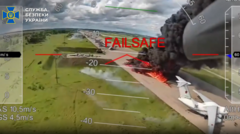As Myanmar copes with one of the deadliest earthquakes in its history, the military's grip complicates relief efforts and raises fears of greater humanitarian disaster.
# Desperate Rescue Efforts Amidst Devastation in Myanmar Following Major Earthquake

# Desperate Rescue Efforts Amidst Devastation in Myanmar Following Major Earthquake
Tension Mounts in Sagaing as Aid is Stalled by Military Interference and Damage Assessment Incomplete
Three days after a devastating 7.7-magnitude earthquake struck Sagaing in Myanmar, the city is struggling to recover amidst bureaucratic shackles and a soaring death toll. With over 2,000 confirmed fatalities and thousands more injured, the isolated community of 300,000 residents is grappling with the aftermath of widespread destruction, including the collapse of roads and significant cultural sites.
On late Friday, the earthquake shook Sagaing, creating chaos not only in this war-torn area but also across larger cities like Mandalay and Naypyidaw, with total damage reports still unfolding. The military regime, a considerable presence in this region, has imposed restrictions on local volunteers eager to assist with search and rescue operations, generating frustration among residents. “The military is not allowing us to help our neighbors,” lamented local volunteer U Tin Shwe outside a monastery where monks remained trapped beneath the rubble. “Only with their permission can we carry out rescues.”
As of Monday, the military government reported the tragic count had climbed to 2,056 deaths, leaving nearly 4,000 injured. Experts warn that initial estimations from the U.S. Geological Survey may suggest that the ultimate toll could surpass 10,000. While international aid groups commenced their arrival in Mandalay and Naypyidaw, local residents have taken to social platforms, pleading for the world to redirect earthquake relief efforts specifically toward Sagaing, its epicenter, where over 80% of the town is believed to be significantly damaged.
As rescue teams are mobilized further afield from Sagaing, the residents remain in dire need of immediate assistance, prompting global calls for urgent intervention and a resolution to military restrictions obstructing effective aid distribution in this crisis-ridden area.





















